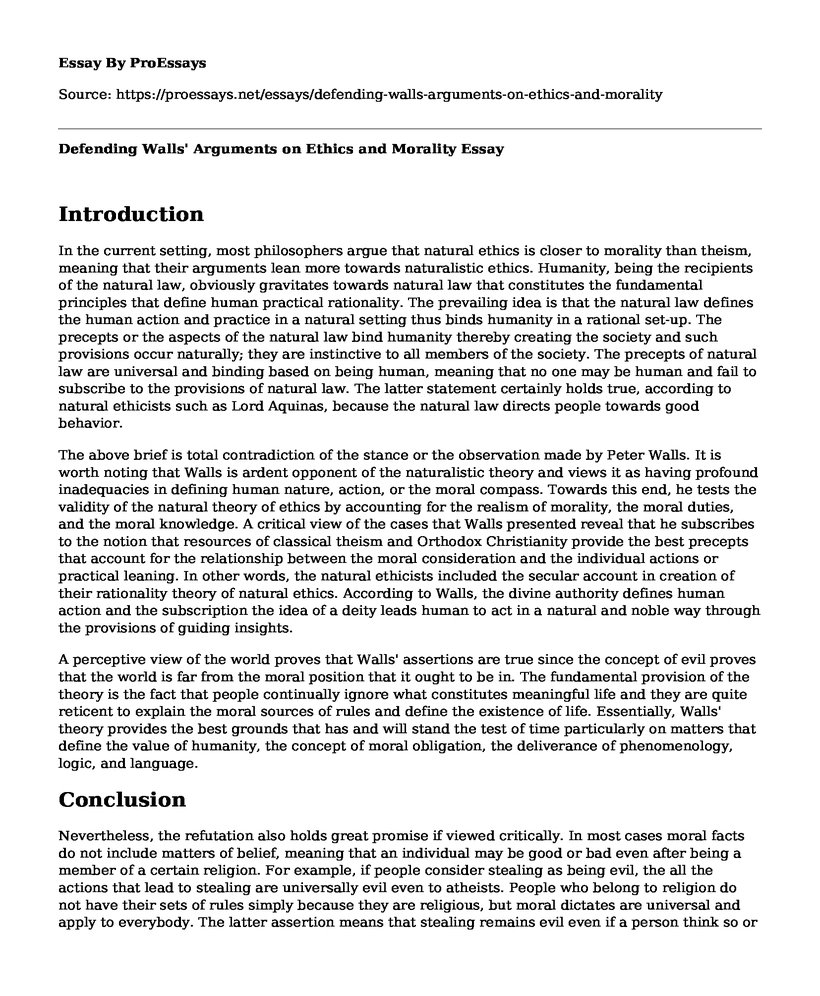Introduction
In the current setting, most philosophers argue that natural ethics is closer to morality than theism, meaning that their arguments lean more towards naturalistic ethics. Humanity, being the recipients of the natural law, obviously gravitates towards natural law that constitutes the fundamental principles that define human practical rationality. The prevailing idea is that the natural law defines the human action and practice in a natural setting thus binds humanity in a rational set-up. The precepts or the aspects of the natural law bind humanity thereby creating the society and such provisions occur naturally; they are instinctive to all members of the society. The precepts of natural law are universal and binding based on being human, meaning that no one may be human and fail to subscribe to the provisions of natural law. The latter statement certainly holds true, according to natural ethicists such as Lord Aquinas, because the natural law directs people towards good behavior.
The above brief is total contradiction of the stance or the observation made by Peter Walls. It is worth noting that Walls is ardent opponent of the naturalistic theory and views it as having profound inadequacies in defining human nature, action, or the moral compass. Towards this end, he tests the validity of the natural theory of ethics by accounting for the realism of morality, the moral duties, and the moral knowledge. A critical view of the cases that Walls presented reveal that he subscribes to the notion that resources of classical theism and Orthodox Christianity provide the best precepts that account for the relationship between the moral consideration and the individual actions or practical leaning. In other words, the natural ethicists included the secular account in creation of their rationality theory of natural ethics. According to Walls, the divine authority defines human action and the subscription the idea of a deity leads human to act in a natural and noble way through the provisions of guiding insights.
A perceptive view of the world proves that Walls' assertions are true since the concept of evil proves that the world is far from the moral position that it ought to be in. The fundamental provision of the theory is the fact that people continually ignore what constitutes meaningful life and they are quite reticent to explain the moral sources of rules and define the existence of life. Essentially, Walls' theory provides the best grounds that has and will stand the test of time particularly on matters that define the value of humanity, the concept of moral obligation, the deliverance of phenomenology, logic, and language.
Conclusion
Nevertheless, the refutation also holds great promise if viewed critically. In most cases moral facts do not include matters of belief, meaning that an individual may be good or bad even after being a member of a certain religion. For example, if people consider stealing as being evil, the all the actions that lead to stealing are universally evil even to atheists. People who belong to religion do not have their sets of rules simply because they are religious, but moral dictates are universal and apply to everybody. The latter assertion means that stealing remains evil even if a person think so or not, and the quality of such an action being evil is void of people's beliefs.
Cite this page
Defending Walls' Arguments on Ethics and Morality. (2022, Mar 27). Retrieved from https://proessays.net/essays/defending-walls-arguments-on-ethics-and-morality
If you are the original author of this essay and no longer wish to have it published on the ProEssays website, please click below to request its removal:
- Arguments in Favor of Objectivism and Subjectivism Essay
- The Trolley Problem and Fat Man Case Essay
- Is The American Dream Dead? - Paper Example
- Most Convincing Account of Morality in Normative Ethics
- The Ethics of Leadership Essay Example
- Essay Example on Determinism: Everything is Pre-Determined, But Reality?
- Plato and Proof for God Paper Example







